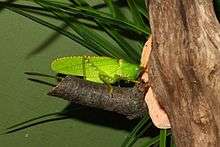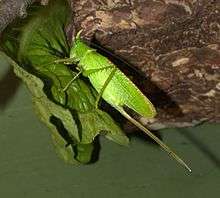Copiphora rhinoceros
Copiphora rhinoceros, the rhinoceros katydid, is a katydid found in Central America.[1] It belongs to a group known as the conehead katydids and can be identified by a horn-like projection on the center of its head. The horn is used to ward off attacks from hungry bats.[2] Unlike most katydids, which are herbivores, the rhinoceros katydid is an omnivore, feeding on fruit, seeds, invertebrates and small lizards.[2] Its lifespan is one to two years.[2]
| Copiphora rhinoceros | |
|---|---|
 | |
| Male | |
 | |
| Female with prominent ovipositor | |
| Scientific classification | |
| Kingdom: | Animalia |
| Phylum: | Arthropoda |
| Class: | Insecta |
| Order: | Orthoptera |
| Suborder: | Ensifera |
| Family: | Tettigoniidae |
| Genus: | Copiphora |
| Species: | C. rhinoceros |
| Binomial name | |
| Copiphora rhinoceros Pictet, 1888 | |
It was first described in 1888 by Alphonse Pictet in his Locustides Nouveaux ou peu connus de Musée de Genève (New or Little-known Locusts of the Geneva Museum).[3]
References
- Cigliano, M. M.; Braun, H.; Eades, D. C.; Otte, D. "species Copiphora rhinoceros Pictet, 1888". orthoptera.speciesfile.org. Orthoptera Species File. Retrieved 28 December 2018.
- "Cincinnati Zoo Invertebrates". Retrieved 2017-02-19.
- Pictet, A. (1888). "Locustides Nouveaux ou peu connus de Musée de Genève". Memoires de la Société de physique et d'histoire naturelle de Genève. 30 (6). Retrieved 28 December 2018.
This article is issued from Wikipedia. The text is licensed under Creative Commons - Attribution - Sharealike. Additional terms may apply for the media files.